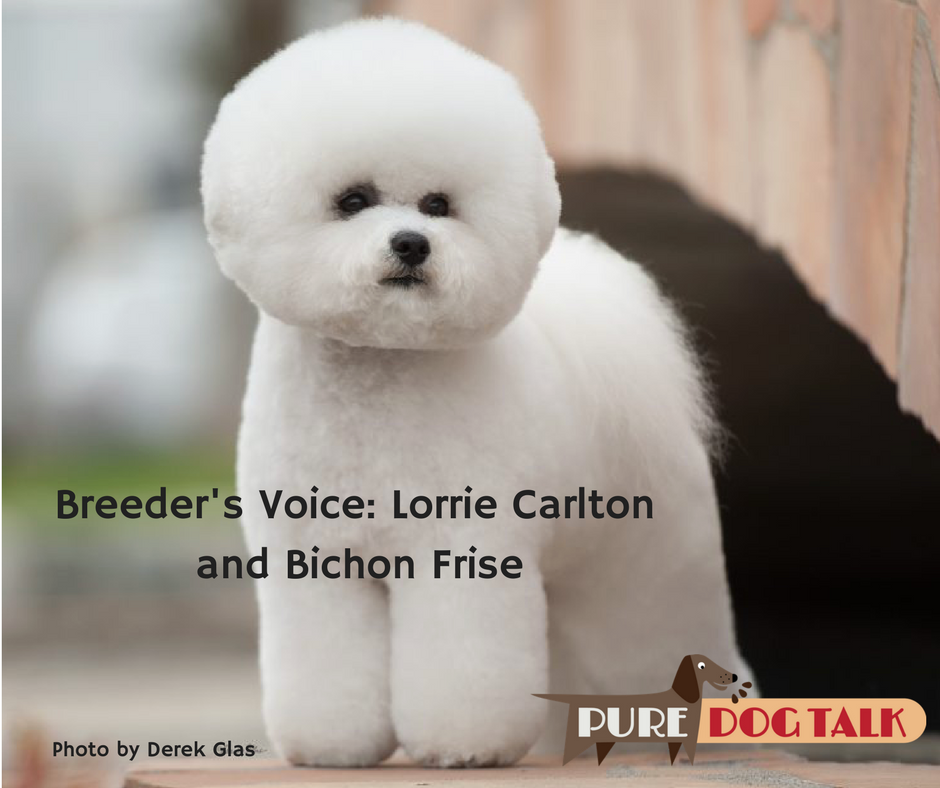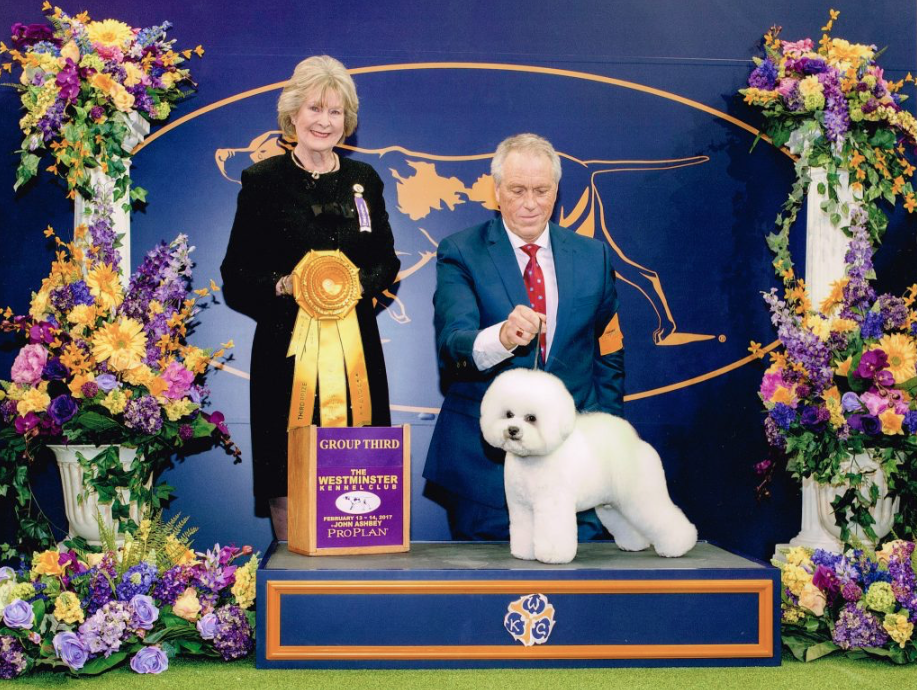142 – Lorrie Carlton|Bichon Frise Breeder of Flynn
Lorrie Carlton and Bichon Frise: Pure Dog Talk Breeder’s Voice
Lorrie Carlton, breeder of Flynn, GCH Belle Creek’s All I Care About Is Love, came to her Bichon Frise breeding program with a background in sporting, hound and working breeds. Her firmly ingrained focus on structure and movement has continued through more than 40 years.
Carlton’s family raised Weimaraners and owned a boarding kennel and grooming shop. She grew up with bird dogs and showed her first dog at 11 years old. The family moved in to handling show dogs and added Old English Sheepdogs to their pack. Carlton worked in the kennel and groom shop after school and learned grooming by watching starting at 14.
Following in her dad’s footsteps, Carlton became a licensed professional handler. Her favorite win? Group 1 with the Borzoi at Westminster Kennel Club in 1993 under Robert Forsyth. She retired the following year to assist her new husband, Larry Letsche, at his veterinary clinic in Michigan.
In 1976, just three years after the breed was recognized by AKC, Carlton piloted a Bichon named Sam to Best in Show in place of her father, who had been hurt. Sam made her fall in love with the breed. Just five years later, she won the national with her first Bichon of her own.
Correct Structure Before a Pretty Face
“I’ve got to have the structure,” Carlton said. “You can fine tune the little things, but you can’t fine tune the whole dog, especially the front. (My first) dogs didn’t have the classical pretty head. I figured I’d breed to the head at some time, but they have to have the structure first.”
Rebuilding her program after a devastating bout with juvenile cataracts in her line, Carlton continued to focus on structure, temperament and health.
“I breed my dogs for myself,” Carlton said. “I want a dog that is sound, that can come, that can go. Yeah, I want a pretty face, just like everybody else does. But I want proper coat, I want proper attitude and I want the health. I don’t want health issues. I can’t say I haven’t had some, but I don’t know anyone breeding dogs for any length of time that hasn’t had some.”
Nicks and Flukes in Breeding Program
Carlton shares her stories about dogs that make a good “nick” with her lines and the “flukes” she won’t use in a breeding program. Her horror stories of breeding the “best to the best” and her preference to breed to the sire of a dog she likes.
“Successful breeders are honest with themselves,” Carlton said. “They are honest with what they have. They are not willing to compromise. They have a standard that they have set for themselves.”
Raising Bichon Frise Puppies
Carlton’s puppies are born in her kitchen, go to work at the vet clinic with Lorrie and Larry. She said they watch the puppies grow, making their selections around 10 weeks. She’s looking for that great puppy that has attitude, a certain look, a pretty face, pretty body.
“We put them on the ground and watch them walk,” Carlton said. “The ones we like, we hang on to. I separate the puppies at 7-8 weeks so they are sleeping the night through in their crates when they go home with new owners. We walk them on a leash. Teach yes and no. For sure, put a little extra into the dogs who have the potential.”
Carlton says she wants watch how the puppies react as they go through training, that she wants them to go through the uglies. “I don’t want them to stay beautiful all the way through (growing up),” she added.
Share the Bichon Frise Love through Mentoring
Love Bichon’s and want to learn more? Lorrie wants to encourage newcomers and offers mentoring to anyone who is interested.
“We need new people,” Carlton noted. “Especially in our coated breeds.”
Bill McFadden and Flynn
Watching Flynn and professional handler Bill McFadden this year has been a treat for Carlton, who normally specials her own dogs.
“It’s nice to be able to see your own dog out there,” Carlton said. “It’s like, wow, this is what 40 years of breeding brought me.”
(…and you know Pure Dog Talk LOVES Mr. Bill)


